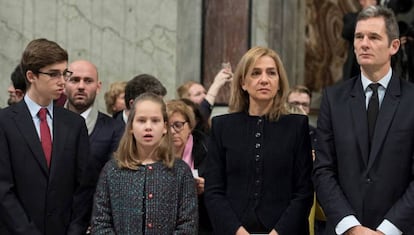Spanish king’s brother-in-law leaves prison for first time to work as volunteer
Iñaki Urdangarin, who is married to Felipe VI’s sister Cristina, will spend two days a week helping disabled adults as he completes his five-year prison sentence for embezzlement

Iñaki Urdangarin, the brother-in-law of Spanish King Felipe VI, began working on Thursday as a volunteer at a center for intellectually disabled adults in the Madrid municipality of Pozuelo de Alarcón.
Urdangarin was granted permission to work as a volunteer against the advice of the public prosecutor
Urdangarin, who is married to the king’s sister Cristina de Borbón, who is known in Spanish as an infanta, is serving a five-year, 10-month prison sentence at the Brieva penitentiary in Álava province for his involvement in a scandal known as the Nóos case. He was found guilty by the Spanish courts of tax fraud, embezzlement and influence peddling, and entered prison on June 18, 2018.
Urdangarin’s visit to the Hogar Don Orione center on Thursday marks the first time the former Olympic handball medalist has left the prison since that date. He was taken out of the penitentiary at 8.58am by car, and arrived at the Hogar Don Orione center at 9.58am. Dressed in a long-sleeved shirt, blue pants and sneakers, he waved but made no comment before entering the facility.
Once inside, Urdangarin met with the director of Hogar Don Orione, Paco Sánchez, who will decide what jobs the king’s brother-in-law will be assigned. The center looks after 140 adults with severe intellectual disabilities. There are 100 professionals working there and 40 volunteers, some of whom are also prison inmates, according to sources from Hogar Don Orione.

Sánchez said that Urdangarin will begin his volunteer work by aiding the teams that help improve the mobility of the center’s members with physiotherapy, as well as psychomotor and sports therapies. He will then be able to take a break for a “sandwich or his lunchbox, if he brings one,” Sánchez added. Urdangarin will spend between five and six hours a day at the center and will be free to move about the facility. “The center is open, there is freedom of movement, but it is normally the members who receive visitors, not the volunteers,” said the director, who described Urdangarin as “grateful and cooperative” and “calm and happy.” At midday, Sánchez gave Urdangarin a tour of the center and handed him a volunteer kit, which included a shirt and ID. He will work at the center twice a week and return to prison before 5pm.
The head of the center described Urdangarin as “grateful and cooperative”
Urdangarin was granted permission to work as a volunteer on Tuesday by Judge Florencio de Marcos at the Castile and León Prison Supervision Court. The decision was made against the advice of prison authorities and the public prosecutor, who consider the king’s brother-in-law to be at “medium-high” risk of re-offending. In his court statement, the judge defended his decision on the basis that Urdangarin is serving his sentence in isolation. The king’s brother-in-law is the only inmate in the “men’s unit” of the Brieva women’s penitentiary, meaning that he has no contact with other prisoners and his social life is restricted to visits from his family. Spanish prison authorities could have transferred the high-profile inmate to another prison, but decided to allow him to stay for security reasons.
In the unusually long 22-page court statement, Judge De Marcos argued that Urdangarin did not choose to serve his sentence in isolation, but rather that it was a decision taken by prison authorities, adding that working “without economic or material compensation” is a way of fostering “pro-social values.”
“In the context of economic crime, which revolves around selfishness, the excessive thirst for profit and disregard of the common interest, having contact with real life, with the problems of others, helps create meaningful awareness about that criminal behavior,” the judge wrote in his statement.
Nóos graft case
Urdangarin and his ex-business associate, Diego Torres, were the leading figures at the Nóos Institute, a non-profit that secured no-bid contracts from the regional governments of Valencia and the Balearic Islands using Urdangarin’s influence.
Urdangarin and Torres also used their non-profit to divert around €6.2 million from public contracts secured for organizing sports events into private accounts. Urdangarin’s wife, Cristina de Borbón, sat on the board of a company, Aizoon, that was allegedly used to channel part of these funds. She was made to testify in the case, and was ultimately fined for having benefited from her husband’s scheme, but was acquitted of tax fraud complicity.
English version by Melissa Kitson.
Tu suscripción se está usando en otro dispositivo
¿Quieres añadir otro usuario a tu suscripción?
Si continúas leyendo en este dispositivo, no se podrá leer en el otro.
FlechaTu suscripción se está usando en otro dispositivo y solo puedes acceder a EL PAÍS desde un dispositivo a la vez.
Si quieres compartir tu cuenta, cambia tu suscripción a la modalidad Premium, así podrás añadir otro usuario. Cada uno accederá con su propia cuenta de email, lo que os permitirá personalizar vuestra experiencia en EL PAÍS.
¿Tienes una suscripción de empresa? Accede aquí para contratar más cuentas.
En el caso de no saber quién está usando tu cuenta, te recomendamos cambiar tu contraseña aquí.
Si decides continuar compartiendo tu cuenta, este mensaje se mostrará en tu dispositivo y en el de la otra persona que está usando tu cuenta de forma indefinida, afectando a tu experiencia de lectura. Puedes consultar aquí los términos y condiciones de la suscripción digital.








































